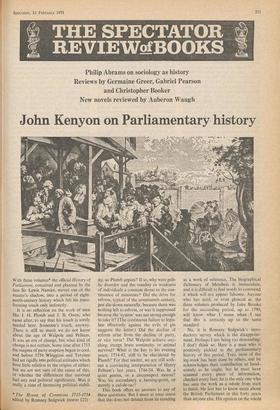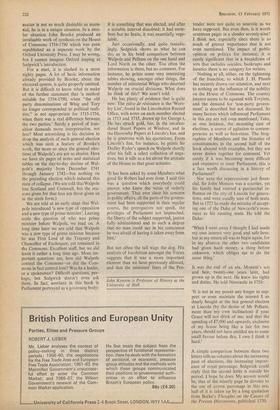Philip Abrams on sociology as history Reviews by Germaine Greer,
Gabriel Pearson and Christopher Booker New novels reviewed by Auberon Waugh
John Kenyon on Parliamentary history
With these volumes* the official History of Parliament, conceived and planned by the late Sir Lewis Namier, moves out of the master's shadow, into a period of eight- eenth-century history which felt his trans- forming touch only indirectly.
It is no reflection on the work of men like J. 1-I. Plumb and J. B. Owen, who came after, to say that his touch is sorely needed here. Someone's touch, anyway. There is still so much we do not know about the age of Walpole and Pelham. It was an era of change, but what kind of change is not certain. Some time after 1715 the magma of party eruption began to cool, and before 1754 Whiggisni and Toryism had set rigidly into political attitudes which bore little relation to the origins of either; but we are not sure of the cause of this, or whether the differences that survived had any real political significance. Was it really a time of increasing political stabil- * The House of Commons 1715-1754 edited by Romney Sedgwick (uMso £22) ity, as Plumb argues? If so, why were pub- lic disorder and the venality or weakness of individuals a constant threat to the con- tinuance of ministries? Did the drive for reform, typical of the seventeenth century, just die down naturally, because there was nothing left to reform, or was it suppressed because the 'system' was not strong enough to take it? (The continuous failure to legis- late effectively against the evils of gin suggests the latter.) Did the decline of reform arise from the decline of party, or vice versa? Did Walpole achieve any- thing. except brute continuity, or animal survival? What is the key to his evening years, 1734-42, still to be elucidated by Plumb? For that matter, we are still with- out a convincing interpretation of Henry Pelham's last years, 1744-54. Was he a quiet genius, or a Circumspect moron? Was his ascendancy a turning-point, or merely a cul-de-sac?
This book offers no answers to any of these questions. But I must at once stress. that this does not detract from its standing as a work of reference. The biographical dictionary of Members is immaculate, and it is difficult to find words to commend it which will not appear fulsome. Anyone who has used, or even glanced at, the three volumes produced by John Brooke for the succeeding period, up to 1790, will know what 1 mean when I say that this is certainly up to the same standard.
No, it is Romney Sedgwick's intro- ductory survey which is the disappoint- ment. Perhaps I am being too demanding; I don't think so. Here is a man who is positively pickled in the parliamentary history of this period. True, most of the leg-work has been done by others, and he acknowledges their contribution as hand- somely as he ought; but he must have scanned every piece of information, checked every fact; he is the only one who has seen the work as a whole from start to finish. He just has to know more about the British Parliament in this forty years than anyone else. His opinion on the whole matter is not so much desirable as essen- tial; he is in a unique situation. In a simi- lar situation John Brooke produced an invaluable work of synthesis on the House of Commons 1754-1790 which was even republished as a separate work by the Oxford University Press. I may be wrong, but I cannot imagine Oxford leaping at Sedgwick's introduction.
For a start, it is slashed to a mere eighty pages. A lot of basic information already provided by Brooke, about the electoral system, is quite properly omitted. But it is difficult to know what to make of the further statement that 'a method suitable for 1754-1790, when "the old party denominations of Whig and Tory no longer corresponded to political reali- ties," is not appropriate for 1715-1754, when there was a real difference between the two parties.' Surely a period of tran- sition demands more interpretation, not less? Most astonishing is his decision to drop the analysis of each general election which was such a feature of Brooke's work, the more so since the general elec- tions of Walpole's era are so elusive. Here we have six pages of notes and statistical tables on the day-to-day decline of Wal- pole's majority from December 1741 through January 1742—but nothing on the preceding election which induced this state of collapse. (We are told that Walpole lost Scotland and Cornwall, but the rea- sons given for that loss are those given us in the sixth form.) We are told at an early stage that Wal- pole introduced 'a new type of opposition and a new type of prime minister'. Leaving aside the question of who was prime minister before Walpole, we read on. A long time later we are told that Walpole was a new type of prime minister because- he was First Lord of the Treasury and Chancellor of Exchequer, yet remained in. the Commons. Excellent stuff, but we did learn it rather a long time ago. More im- portant questions are, how did Walpole control the Commons—or did the Com- mons in fact control him? Was he a leader, or a spokesman? Difficult questions, per- haps, but Sedgwick doesn't even ask them. In fact, nowhere in this book is Parliament portrayed as a governing body; it is something that was elected, and after a suitable interval dissolved; it had mem- bers but no brain; it was essentially vege- table.
Just occasionally, and quite tantalis- ingly, Sedgwick shows us what he can do; as in his brief comparison between Walpole and Pelham on the one hand and Lord North on the other. Too often the information is there, but no comment. For instance, he prints some very interesting tables showing, amongst other things, the number of ministerial Whigs who deserted Walpole on crucial divisions. What does he think of this? We aren't told.
He has plenty of evidence that is quite new. The piece de resistance is the 'Wors- ley List', found in the Lincolnshire Record Office, with notes on each member elected in 1713 and 1715, drawn up for George t. He has struck gold, too, in the uncalen- dared Stuart Papers at Windsor, and in the Harrowby Papers at Lincoln's Inn, and he is generous with his quotations. From Lincoln's Inn, for instance, he prints Sir Dudley Ryder's speech on Walpole shortly after his fall; a select collection of nega- tives, but it tells us a lot about the attitude of the House to that great minister.
`It has been asked by some Members what good Sir Robert had ever done. I said this was a question which everybody could answer who knew the value of orderly government. That ever since his concern in public affairs, all the parts of the govern- ment had been supported in their regular course, the prerogatives not spoilt, the privileges of Parliament not impeached, the liberty of the subject supported, justice fully administered and to such a degree that no man could say in his conscience he was afraid of having it taken away from him.'
But too often the tail wags the dog. His analysis of Jacobitism amongst the Tories suggests that it was a more important element than we have previously allowed, and that the ministers' fears of the Pre- John Kenyon is Professor of History at the University of Hull tender were not quite so neurotic as we have supposed. But even then, is it worth seventeen pages in a slender seventy-nine?
I think not, especially since there is so much of greater importance that is not even mentioned. The impact of public opinion on politics for instance; it is surely significant that in a breakdown of MPS that includes suicides, bankrupts and lunatics there is no category for writers.
Nothing at all, either, on the tightening of the franchise, to which J. H. Plumb has recently drawn our attention, and next to nothing on the influence of the nobility on the House of Commons. The country interest seems to be equated with Toryism, and the demand for 'non-party govern- ment' is described but not discussed. So many factors which influenced Parliament in this era are not even mentioned. Take, as one instance, the mounting cost of elections, a source of agitation to contem- poraries as well as 'historians. The biog- raphies of Members and the histories of constituencies in the second half of the book abound with examples, but they are never draWn together for comment. Yet surely if it was becoming more difficult and expensive to enter Parliament, this is a fact worth discussing in a history of Parliament?
Nor were the repercusions just finan- cial. Sir John Monson was a courtier, yet his family had exerted a patriarchal in- fluence on the city• of Lincoln for genera- tions, and were usually sure of both seats. But in 1727 he made the mistake of accept- ing one of the Duke of Newcastle's nom- inees as his running mate. He told the Duke: `When I went away I thought I had made my own interest very good and safe here; but at my return all was to begin again, for in my absence the other two candidates had given hard money; a thing before unknown, which obliges me to do the same thing.'
It was the end of an era. Monson's son and heir, twenty-one years later, had grown up in the next. He knew his rights and duties. He told Newcastle in 1758: 'It is not in my power any longer to sup- port or even maintain the interest I so dearly bought at the last general election at Lincoln (by the desire of Mr Pelham, more than my own inclination) if your Grace will not think of me; and that the spending of £7,000 and upwards, exclusive of my house being like a fair for two years, should not have entitled me to some small favour before this, I own I think it hard.'
A simple comparison between these two letters tells us volumes about the increasing pace of elections, the increasing import- ance of royal patronage. Sedgwick could reply that the second letter is outside his period. I hope he does. My answer would be, that of the miserly page he devotes to the use of crown patronage in this era, half of it is taken up by a long quotation from Burke's Thoughts on the Causes of the Present Discontents, published 1770.



































 Previous page
Previous page